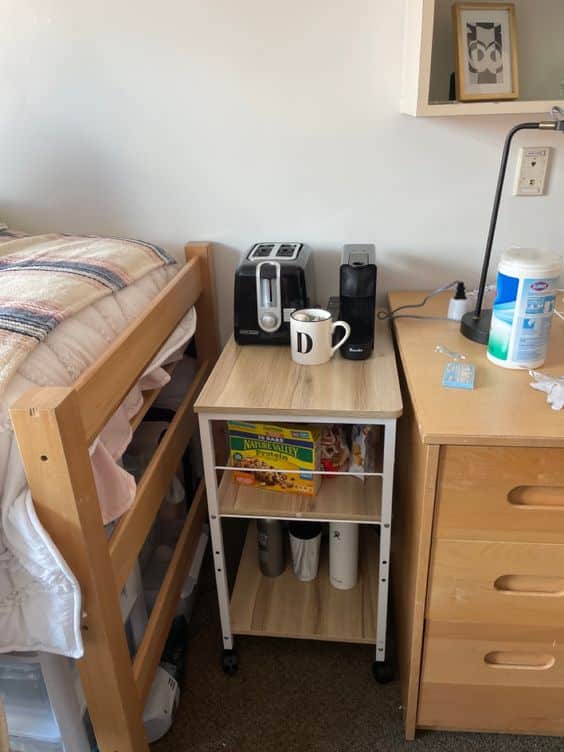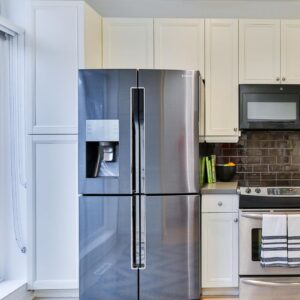
Living in a dormitory can be an exciting and transformative experience for college students, but it also comes with challenges and restrictions. Among these restrictions are guidelines surrounding the use of appliances in dorm rooms. While some students may dream of cozy mornings with the aroma of freshly toasted bread, the question arises: can you have a toaster in a dorm? Navigating the intricate web of dorm room appliance restrictions requires understanding the rules and regulations imposed by universities and the potential consequences of violating them.
Some colleges may allow small appliances such as toasters in dorm rooms, while others may not due to fire and safety concerns. It’s always a good idea to check the guidelines on your university’s website and housing policy forms to ensure all items you’re packing are allowed in your room.
In this article, we delve into the complex world of dorm room appliance restrictions, exploring the factors that shape these policies and offering insights on how students can navigate them to create a comfortable and functional living space.
Understanding Dorm Room Appliance Restrictions
Understanding dorm room appliance restrictions is essential for college students who want to create a comfortable living space within the confines of their dormitory. These restrictions vary from one university to another and are typically implemented for safety, energy conservation, and practicality reasons. By familiarizing themselves with these rules, students can navigate the limitations and make informed decisions regarding the appliances they can bring into their dorm rooms.
Universities often provide a comprehensive list of approved and prohibited appliances to ensure students’ well-being and preserving dormitory facilities. Common restrictions may include bans on high-wattage devices, open-flame appliances, and appliances that pose a fire hazard or consume excessive energy. Additionally, noise levels and the potential disruption caused by certain appliances may also factor into the regulations. Understanding the reasons behind these restrictions can help students appreciate the importance of adhering to them and seeking alternative solutions that comply with the rules while still meeting their needs.
By thoroughly understanding the appliance restrictions specific to their dormitory, students can avoid penalties, such as fines or disciplinary actions, while fostering a positive living environment. Furthermore, this knowledge enables them to explore alternative appliances allowed within the regulations, seek exceptions when necessary, and find creative ways to maximize functionality and convenience within their living space. Ultimately, by comprehending the dorm room appliance restrictions, students can navigate these limitations effectively and create an environment that promotes safety and comfort during their college experience.
Related posts you may like: Are Air Fryers Allowed in Dorms? Exploring Dormitory Cooking Regulations
University Policies: Decoding the Dos and Don’ts
Understanding the specific university policies regarding dorm room appliance restrictions is crucial for college students. Each university has its own set of rules and regulations in place to maintain a safe and harmonious living environment for all residents. Decoding these policies involves delving into the dos and don’ts that govern the use of appliances within dorm rooms.
University policies regarding dorm room appliances typically outline the specific appliances that are allowed or prohibited. They may provide a detailed list or specify general guidelines, such as wattage limits or restrictions on open flames. Students must familiarize themselves with these policies to ensure compliance and avoid potential consequences.
Decoding the dos and don’ts also involves understanding the reasoning behind these policies. Universities prioritize student safety, energy conservation, and noise control. By comprehending the motivations behind the rules, students can gain insight into why certain appliances are restricted and make informed choices in selecting alternatives that meet their needs while adhering to the policies.
Furthermore, university policies may outline the process for seeking exceptions or special permissions for appliances that fall outside the standard guidelines. Understanding the procedures and requirements for obtaining such exemptions can benefit students with specific needs or circumstances that warrant using prohibited appliances.
Decoding the university policies surrounding dorm room appliance restrictions is crucial in ensuring a smooth and compliant living experience. By familiarizing themselves with the dos and don’ts, students can navigate these policies effectively, make informed decisions, and create a comfortable living space within the prescribed guidelines.
Related posts you may like: Do Dorm Rooms Have Their Own Bathrooms? A Guide for Prospective College Students
Navigating the grey areas of dorm room appliance restrictions can be challenging for college students. While universities typically list allowed and prohibited appliances, ambiguous areas require careful consideration and clarification. Understanding what falls within the realm of permissibility and what does not is essential for students seeking to make the most of their living space.
In some cases, the university policies may not explicitly address certain appliances or provide specific guidelines for their usage. This can create uncertainty and confusion regarding their permissibility. It is important for students to proactively seek clarification from the appropriate university authorities, such as residential advisors or housing departments, to ensure they comply with the rules.
Students should consider safety, energy conservation, and noise levels when navigating the grey areas. They should evaluate whether a particular appliance aligns with the overall goals and intentions of the dorm room appliance restrictions. Additionally, consulting with roommates and engaging in open communication can help establish consensus and ensure a harmonious living environment.
Exploring alternative options that serve the same purpose can be a viable solution when a desired appliance may not be explicitly allowed. For example, if a toaster is prohibited, a toaster oven may be a permissible alternative that offers similar functionality.
Navigating the grey areas of dorm room appliance restrictions requires careful consideration, proactive communication, and adherence to the underlying principles behind the rules. By seeking clarification, evaluating alternatives, and engaging in open dialogue, students can navigate these ambiguous areas effectively and create a living space that balances comfort and compliance.
Related posts you may like: How to Make Your Dorm Room Smell Good: Tips and Tricks for a Fresh-Smelling Space
Consequences of Violating Dorm Room Appliance Rules
Understanding the consequences of violating dorm room appliance rules is crucial for college students. Universities enforce these rules to ensure their residents’ safety and well-being and maintain the dormitory facilities’ integrity. Failing to comply with these regulations can result in consequences that significantly impact a student’s living experience.
One of the common consequences of violating appliance rules is disciplinary action. This can range from receiving warnings or fines to more severe penalties, such as probation or loss of housing privileges. Universities take these violations seriously and may have a progressive disciplinary system where repeated infractions lead to more severe consequences.
Violating appliance rules can also have practical implications. Appliances that pose safety risks, such as those with open flames or high wattage, can lead to accidents, fires, or power outages. In such cases, not only does the student responsible for the violation face disciplinary action, but they may also be held financially liable for any damages caused.
Moreover, violating appliance rules can strain relationships with roommates and neighbors. Appliances that generate excessive noise or consume excessive energy can disrupt the living environment and create conflicts. This can lead to strained relationships, complaints, and potential difficulties in fostering a harmonious community within the dormitory.
Students must familiarize themselves with and abide by the regulations to mitigate the consequences of violating appliance rules. This includes being aware of the specific restrictions, seeking clarification when needed, and finding suitable alternatives that comply with the rules. Open communication with roommates and adherence to common courtesy can also help prevent conflicts and maintain a positive living environment.
Understanding the potential consequences of violating dorm room appliance rules empowers students to make responsible choices and create a safe and compliant living space. By respecting these regulations, students can avoid disciplinary actions, promote a harmonious community, and prioritize their well-being and that of their fellow residents.
Creative Alternatives: Appliances That Pass the Test
When faced with dorm room appliance restrictions, college students can explore creative alternatives that adhere to the rules while providing functionality and convenience. By thinking outside the box, students can find appliances that pass the test and meet their needs within the limitations set by the university.
One option is to utilize multi-purpose appliances. These versatile devices can perform multiple functions, allowing students to maximize their utility while minimizing the number of appliances in their dorm room. For example, a microwave oven with a built-in toaster or a combination coffee maker that also serves as a mini-fridge can be efficient solutions that comply with the restrictions.
Another approach is to explore compact or portable appliances. These smaller-sized appliances are often designed with space-saving in mind, making them suitable for dormitory living. Compact appliances like mini-fridges, single-burner cooktops, or electric kettles can provide essential functionalities without violating size or wattage restrictions.
Embracing technology can also offer innovative alternatives. With the rise of smart devices, students can leverage smartphone-controlled appliances or smart home systems to streamline their daily routines. For instance, using a smart plug to control a coffee maker or a toaster remotely can provide convenience while complying with the regulations.
Additionally, students can consider communal spaces within the dormitory or campus that offer shared access to permitted appliances. Common areas, such as kitchenettes or designated cooking areas, may allow students to use appliances like toasters or blenders under controlled circumstances, enhancing their culinary options without violating individual dorm room restrictions.
By exploring these creative alternatives, students can find appliances that pass the test and enhance their dorm room experience within the confines of the university’s rules. It is important to research and understand the specific restrictions, seeks guidance from residential staff, and prioritize safety and compliance when selecting and using these alternative appliances.
Related posts you may like: Are Mini-Fridges Allowed In College Dorms? (& 5 Best Ones)
Tips for Creating a Functional Living Space within the Restrictions
Creating a functional living space within the restrictions of dorm room appliance policies is essential for college students. Here are some tips to help navigate these limitations and optimize your dorm room experience:
- Familiarize yourself with the rules: Start by thoroughly reading and understanding the specific appliance restrictions and guidelines provided by your university. Take note of permitted appliances, size limitations, wattage restrictions, and other relevant details.
- Prioritize essential appliances: Identify the most important to you for daily living. Consider items like a mini-fridge, microwave, or electric kettle, often allowed in dorm rooms. Focus on appliances that serve multiple purposes or are essential to your needs.
- Embrace space-saving solutions: Make the most of your limited space by choosing compact and collapsible appliances. Look for mini versions of commonly used appliances or devices that can be easily stored when not in use. This allows you to have the functionality you need without sacrificing valuable space.
- Utilize versatile tools: Invest in multi-purpose tools and gadgets that perform various tasks. For example, a blender that functions as a food processor or a combination rice cooker and steamer can help you prepare a range of meals without needing multiple appliances.
- Opt for shared appliances: Explore communal spaces within your dormitory or campus that offer shared access to permitted appliances. This could include kitchenettes or common areas with toasters, blenders, or other appliances. Utilizing these spaces can expand your cooking options while adhering to the rules.
- Maximize efficiency with accessories: Use accessory items to enhance the functionality of your allowed appliances. For instance, toaster bags can enable you to toast bread in a shared toaster without violating rules. Similarly, utilizing microwave-safe cookware and containers can expand your microwave cooking possibilities.
- Communicate with roommates: Coordinate with your roommates to avoid unnecessary duplication of appliances. Collaborate on a shared appliance plan to ensure that each person has access to the essentials while minimizing clutter and ensuring compliance with the rules.
- Seek exceptions if necessary: In special cases requiring a specific appliance for medical reasons or extenuating circumstances, consider contacting the appropriate university authorities to inquire about exceptions or special permissions.
By following these tips, you can create a functional and comfortable living space within the restrictions of dorm room appliance policies. Remember to prioritize safety, consider energy conservation, and respect the guidelines set by your university to maintain a positive living environment.




